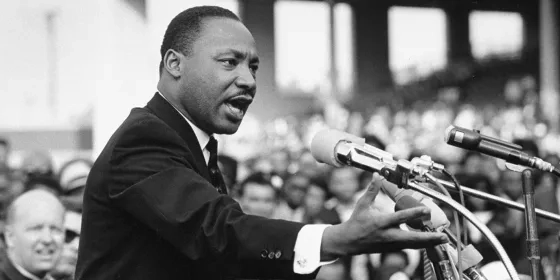MLK Jr. on Jazz: The Soundtrack of Civil Rights
In a 1964 essay, Dr. Martin Luther King, Jr. explains the importance of jazz music and its role in the story of civil rights.
By Mark Taylor
“Jazz speaks for life. The Blues tell the story of life’s difficulties.”
Those words by Dr. Martin Luther King, Jr. can be found at the beginning of his essay for the inauguration of the Berlin Jazz Festival in 1964. It might be one of Dr. King’s lesser known speeches, but today remains one of the most profound essays about jazz and its role in civil rights.
Often called America’s one true art form, in his own words Dr. King also acknowledges jazz as a powerful tool in the story of civil rights, writing in 1964, “Much of the power of our Freedom Movement in the United States has come from this music. It has strengthened us with its sweet rhythms when courage began to fail. It has calmed us with its rich harmonies when spirits were down.” That same year Dr. King played an essential role in the passing of the Civil Rights Act and appeared on the cover of Time magazine as “Man of the Year.”
Though written decades ago, it’s a speech that SFCM’s Jason Hainsworth shares with his students every year on Martin Luther King, Jr. Day. Hainsworth said, “I think it's an important statement from one of the world's most important figures of all time. I never had a teacher share this information with me so when I discovered it I thought ‘Wow, how come nobody ever talks about this?’”
Hainsworth is the executive director of the Roots, Jazz, and American Music program and associate dean of diversity, equity, and inclusion at SFCM, which just announced the opening of applications for the Emerging Black Composers Project and a new fellowship with the San Francisco Ballet to support Black musicians.
In the essay, Dr. King remarks on how long before modern scholars wrote of racial identity, jazz musicians were already approaching the topic through music.
Hainsworth has plenty of examples. “Charles Mingus' piece entitled Fables of Faubus, John Coltrane's Alabama, and Nina Simone's Mississippi Goddamn …These were pieces that spoke to racism during the times in which these musicians were living. They also speak to the incredible spirit and force Black musicians have been able to create art under intense racial unrest and hatred.”
The speech also notes how jazz music brings people together, not only through struggle, but also joy and community. “Everybody has the Blues, Everybody longs for meaning,” writes Dr. King.
For Hainsworth those words can be interpreted to mean that music is universal and feeling and connecting to sound and lyrics is something most if not all people do. “You don’t have to be an intellectual or well-studied to feel the emotional and musical impact behind the Blues. The same for jazz. All you have to do is listen and let the sound of it take you on the journey,” he added.
In the political climate of today, Dr. King’s Berlin Jazz Festival essay can be a reminder of the impact that music has on people’s lives. While a speech or protest may come and go, music lives on.
“As musicians we can’t forget that real progress and change isn't quick and easy,” said Hainsworth. “Most times, in fact, it's dirty, slow, sometimes anger-fueled and that speaks to the experience resilience of Black people in America and the music which is borne from these experiences.”
Dr. Martin Luther King, Jr.’s Address for the 1964 Berlin Jazz Festival:
God has wrought many things out of oppression. He has endowed his creatures with the capacity to create—and from this capacity has flowed the sweet songs of sorrow and joy that have allowed man to cope with his environment and many different situations.
Jazz speaks for life. The Blues tell the story of life’s difficulties, and if you think for a moment, you will realize that they take the hardest realities of life and put them into music, only to come out with some new hope or sense of triumph.
This is triumphant music.
Modern jazz has continued in this tradition, singing the songs of a more complicated urban existence. When life itself offers no order and meaning, the musician creates an order and meaning from the sounds of the earth which flow through his instrument.
It is no wonder that so much of the search for identity among American Negroes was championed by Jazz musicians. Long before the modern essayists and scholars wrote of racial identity as a problem for a multiracial world, musicians were returning to their roots to affirm that which was stirring within their souls.
Much of the power of our Freedom Movement in the United States has come from this music. It has strengthened us with its sweet rhythms when courage began to fail. It has calmed us with its rich harmonies when spirits were down.
And now, Jazz is exported to the world. For in the particular struggle of the Negro in America there is something akin to the universal struggle of modern man. Everybody has the Blues. Everybody longs for meaning. Everybody needs to love and be loved. Everybody needs to clap hands and be happy. Everybody longs for faith.
In music, especially this broad category called Jazz, there is a stepping stone towards all of these.
